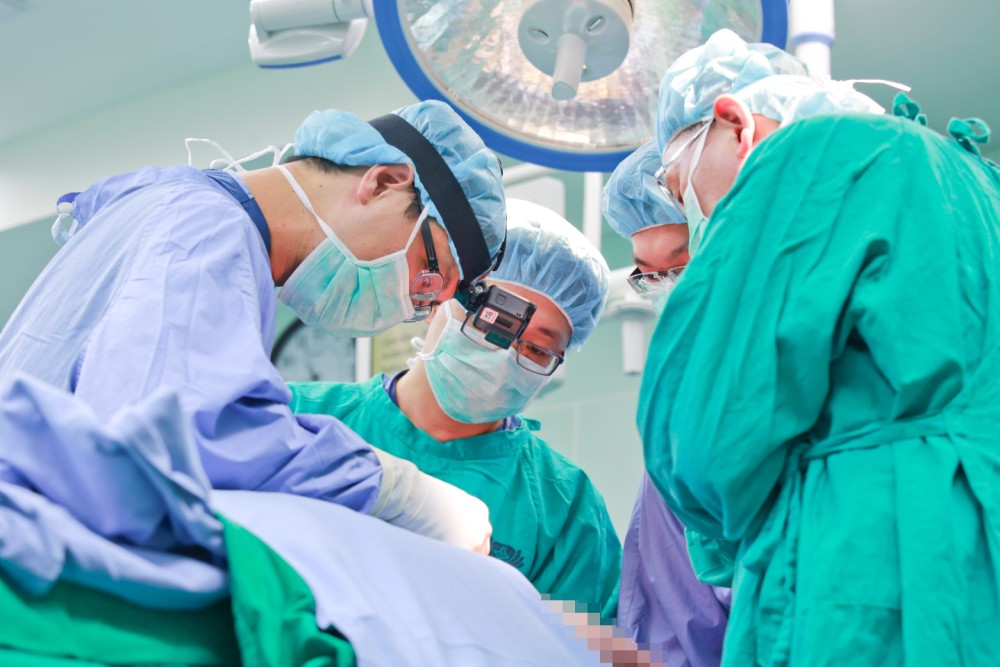By Li Chia-Yi, Yu Shu-Hua, Huang Shi-Chi Translated by Alison Tsai
On November 3, 2006, the Department of Plastic Surgery and Cardiovascular Surgeons of Taiwan held a joint program on simulated surgery. A total of 57 physicians from 37 different hospitals were enrolled. Photography / Xu Ronghui
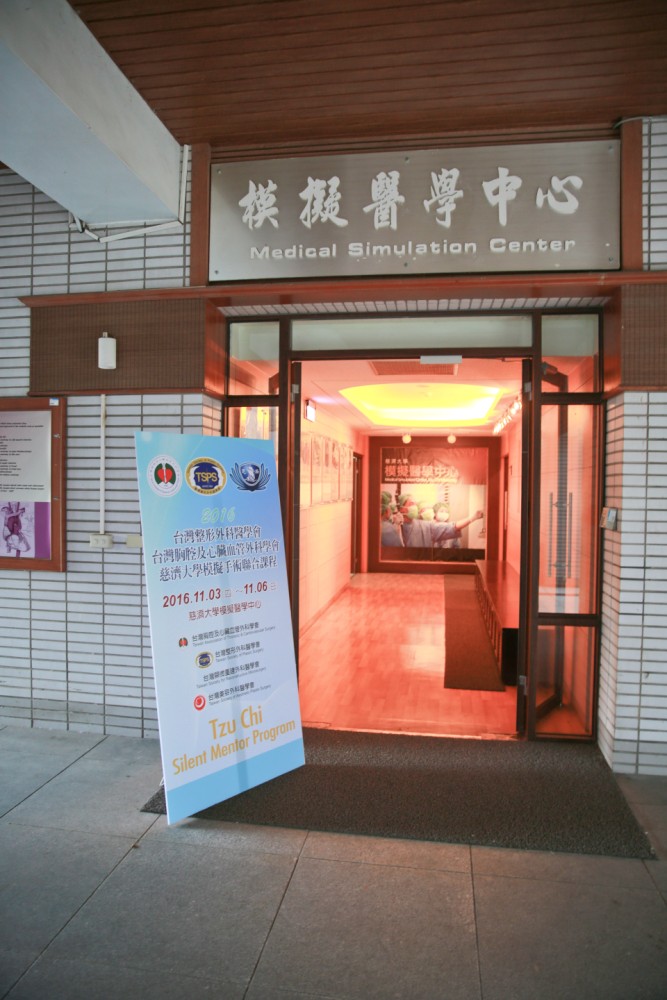
Silent Mentor and advanced surgical simulation
“My father will become more handsome after plastic surgery; he would have no sagging skins. I think that it is great,” said Lu Yi-Hua to the doctors who will be practicing surgery on the cadaver.
Lu Yi-Hua’s father (Lu Wen-Yi) dies in June of 2016 at the age of 66. In November the same year, he became one of the cadavers in a simulation surgery for the Taiwan’s Plastic Surgery Association and Cardiovascular Surgery Society. Dharma Master Cheng-Yen referred the cadaver a “silent mentor” – one who exerts the extremity of life, converts useless to great use. At the beginning of the class, Chung-Giang Hospital Dr. Hsiao and Dr. Yen explained to the families that the class would include facial plastic surgery, limb grafting and surgery. Lu Wen-Yi’s family said Lu always enjoyed exploration and challenge, and had keen interest in new things so he should be happy to accept all the surgical curriculums.
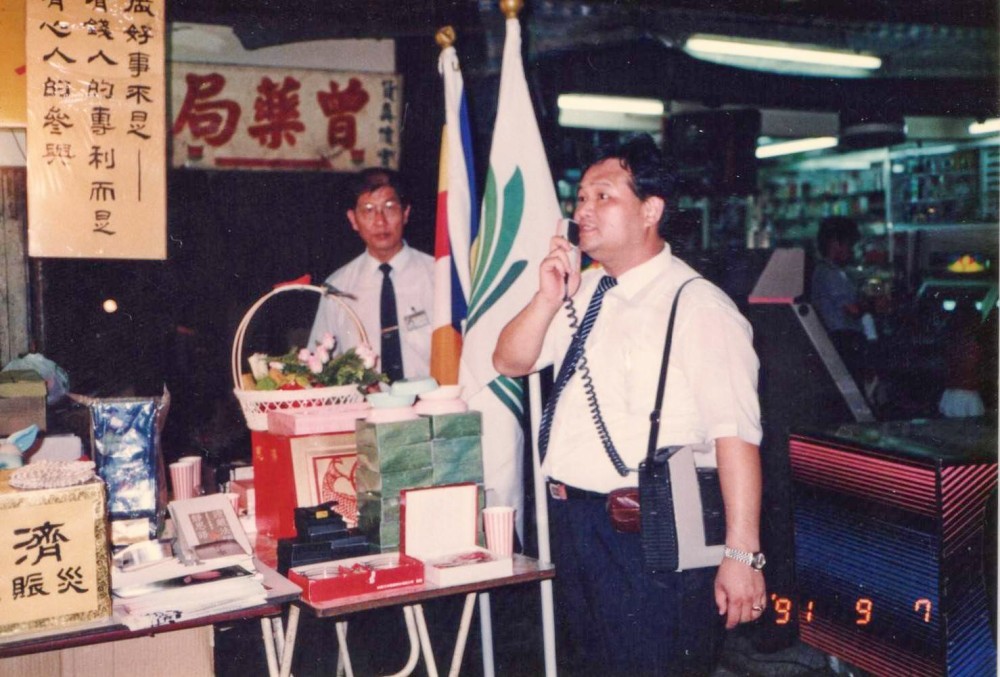
Family of Lu Wen Yi respected his last wish to allow him to become a silent mentor. Picture – Brother Lu Wen Yi’s participation with Tzu Chi activities. Picture provided by family of Lu Wen Yi
Form November 2nd to the 7th of 2016, Tzu Chi University hosted a joint program with the Taiwan Plastic Surgery and Cardiovascular Surgical Association. At the same time, in conjunction with Hualien Tzu Chi Hospital, the 6th Tzu Chi Medical Education Day special exhibits consists of two main features of the Tzu Chi Medical Education – the silent mentor versus the good teacher (a standard patient).
Doctors making home visits to get to know the cadavers on the operating tables
For this simulation program, a total of 184 plastic surgeons and cardiovascular surgeons from 37 hospitals throughout Taiwan participated in 57 mocked operations.
Before the commencement of the program, enrolled physicians and teaching physicians would visit the families of those silent mentors and learn about their life stories. In September 2016, Hospitals’ physicians Lingo ChangGung, Yan ZhengYi, Xiao RuiJun, and Director Liao HanCong and Hualien Tzu Chi Hospital Dr. Weng RiSheng visited Lu WenYi’s house. Dr. Yen said this was an experience she had never had. During her residency, there were also cadavers, but students only knew their names but not their stories. This time they visited the homes of these silent mentors to learn their spiritual world; the experience brought students not only medical knowledge but also deep respect and gratitude.
Silent mentor Lu graduated from the Department of Law of Chung Hsin University. If there was a phrase to describe him, that would be a diligent worker who was admired by colleagues and appreciated by many large companies. Lu became familiar with Tzu Chi from early on. When Tzu Chi was short on funds to build a hospital in Hualien, during the very first large scale fundraising event held in Taipei in 1983, Lu was one of the promoting participants. Because of his Buddhist background, Lu saw life and death plainly. When diagnosed with gastric cancer in 2014, Lu said, “Waking up daily, if I can still walk, if I can still eat, I’ve gained another day and thus I should be grateful and seize the moment of life.”
Lu was diagnosed with diabetes when he was about twenty. At the time, he had the idea of donating his body for medical research. A month prior his death when he was almost paralyzed and in and out of coma, his family asked him if he would like to donate his body, his eyes became wide and clear and he nodded his head forcefully. On June 17, 2016, after the family signed the Body Donation Agreement at 8 am in the morning, Lu passed away peacefully at 10 am thereafter. Lu YiWen rationally explained her father’s decision, “It was his body. He made the decision. From the legal perspective, we can only respect him.” They also agreed that cremation yields no closure whereas donating his body will serve a meaningful purpose.
The challenge – hand and foot transplantation
JiaYi Chang Gung Hospital Vice President Lin ZhiHong and Central Research Institute Dr. Wei Fuquan led a team of twenty doctors from various hospitals, including Keelung, Linkou, JiaYi, and Kaohsiung Chang Gung for a special program, which included a 3-day course from November 3rd to 5th on facial, hand, abdominal, and foot operations. They also wore GoPro cameras to record the entire surgical procedures. Vice President Lin ZhiHong expressed that currently in Taiwan, there is only one successful case of hand transplant; however, there are more than 10 patients waiting in line for muscular, nerve, skin, and tendon operations, which are very complex. However, just like the early kidney transplants, through experience and learning, current kidney and other organs transplant operations have become more common. They hope in the future, hand and facial reconstruction can help patients to restore functions so they can return to society.
Since Vice President Lin ZhiHong participated in the Tzu Chi University simulation surgery course in 2010, he often talked about the “silent mentor” with his families. Two years ago in 2014, his father suddenly told him that he would also like to donate his body since his son had benefited greatly from other silent mentors. As a result, Lin asked Hualien Tzu Chi Hospital Chief of Plastic Surgery Department, Dr. Li JunDa, to give him a Body Donation Agreement. Lin’s father is now 88 years old, but the agreement still remains in his office. Lin said it is a difficult decision to agree to the donation. Therefore, he is greatly appreciative of all the silent mentors and their families. Donation program not only promotes medical development but also helps many real patients. He is grateful to have the opportunities to learn at Tzu Chi.
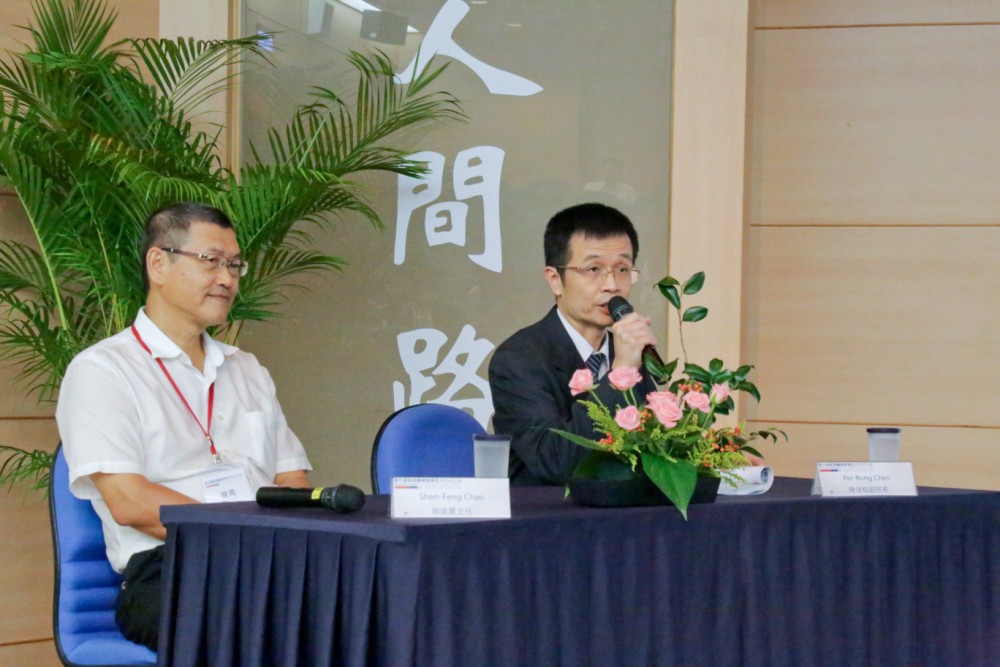
At the 6th Tzu Chi Medical Education Day, Chen Peisong (right), Vice President of Hualien Tzu Chi Hospital, introduced "Tzu Chi Advanced Surgery Course." Left - Zhao Shengfeng, Cardiothoracic surgeon. Photography / mayu ting
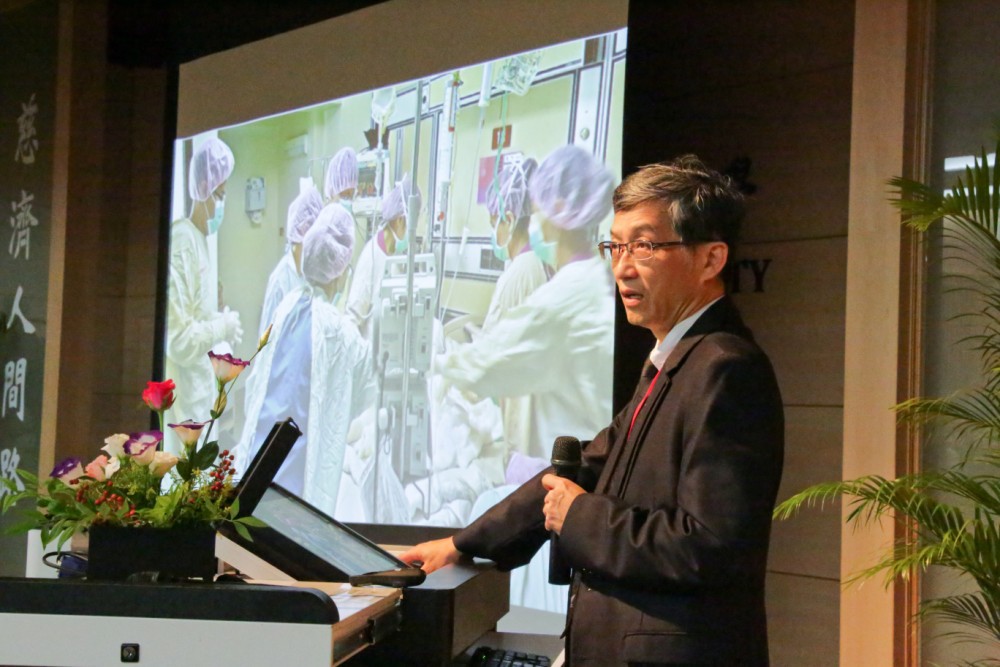
Ma Xu, Director of Taiwan Institute of Plastic Surgery stressed that learning advanced surgery is to be prepared and ready; thanks to the “silent mentor”, doctors were able to practice. Photography / mayu ting
Tribute to Silent Mentors on the sixth Tzu Chi Medical Education Day
The 6th annual Tzu Chi Medical Education Day commenced on November 5th at 1 pm. Speaking at the conference, Hualien Tzu Chi Hospital Dr. Lin HsinLung expressed his gratefulness to all the people who worked conjointly for the development of medical education. He also emphasized that the goal of Tzu Chi’s medical education, whether in the university or hospital, remains the same.
Superintendent Lin HsinLung recalled his early medical education to perform simulation surgical practice. The cadavers came from abroad; and to practice a neurosurgery, a cadaver head was imported from the US. However, at Tzu Chi, under the guidance of Dharma Master, there are body donations to provide medical students to use at various surgical classes. In addition to develop such realistic simulation surgery, we are really grateful for the silent mentors and their family’s great love.
Hualien Tzu Chi Hospital Vice President, Dr. Chen PeiRong, introduced “Tzu Chi Advanced Simulation Surgical Course” in a kick-off during the 5th day lecture conference. Tzu Chi University Vice Principal and anatomy professor, Dr. Zeng Guofan was the keynote speaker. This day’s course focused mainly on leading the trainees to become familiar with “silent mentor” and “body simulation operation.”
Vice Superintendent Chen PeiRong pointed out that in September 2008 at the Tzu Chi Simulation Medical Center, doctors and residents of Tzu Chi Medical Foundation learned advanced surgical simulation practices. Since 2010, Tzu Chi Hospital with departments from Otolaryngology, Urology, Orthopedics, Plastic Surgery, Obstetrics and Gynecology, Neurosurgery, and Dentistry etc., have been holding 1-2 annual advanced simulation surgery practices at the Tzu Chi Simulation Medical Center.
Dr. Chen PeiRong stressed that in addition to traditional teaching, Tzu Chi Medical education also emphasizes the “people oriented” education. Regardless of the anatomy or simulation courses, all participating students and doctors must conduct home visits to understand the silent mentors’ life stories. Procession ceremony of after-simulation cremation is also included in the course. Furthermore, gratitude memorial services are held to pay tribute to the silent mentors and their families. Thus, at the end of the course, not only will students learn bedside medical techniques but also ethics and responsibilities of physicians. He also pointed out that 70% of the current source of the body donation came from Tzu Chi members and their families. The rest had no affiliation with Tzu Chi.
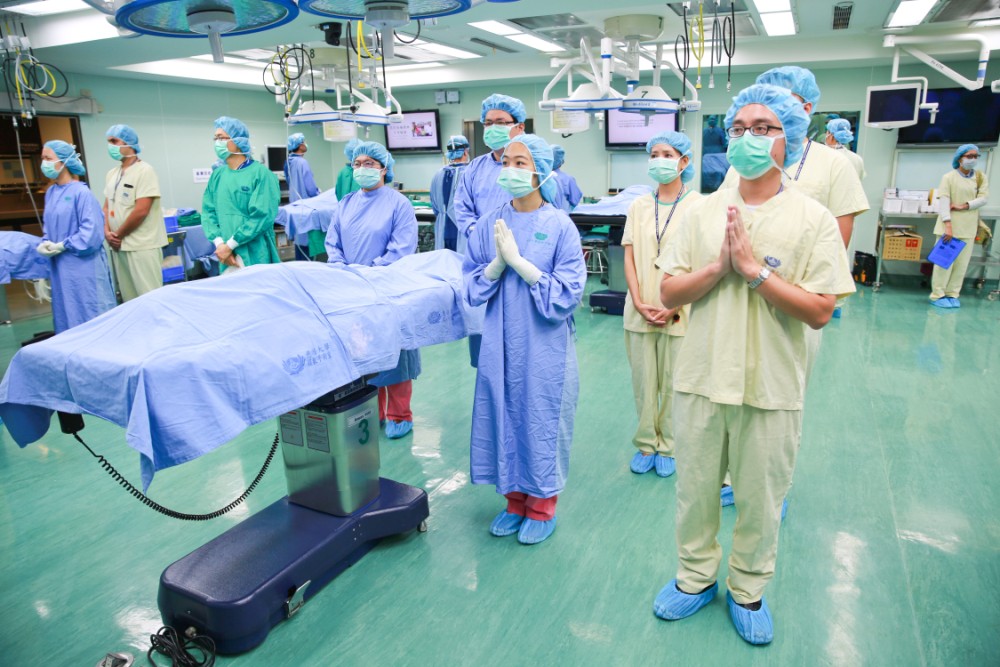
Gratitude toward Silent Mentor prior to surgery
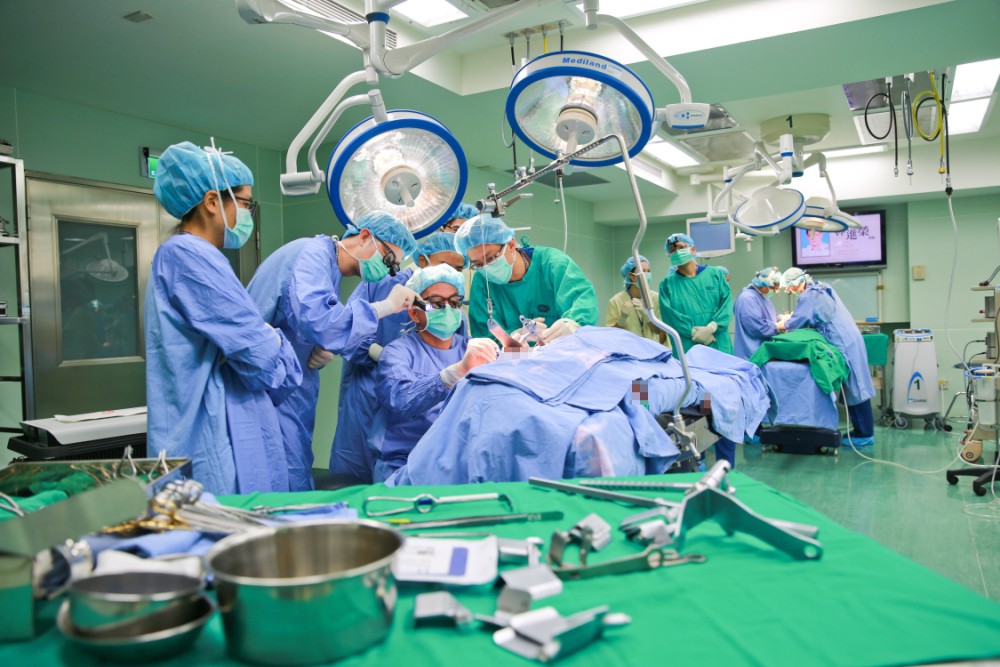
At the beginning of the simulation surgery, all participants prayed to the silent mentors accordingly to their religious beliefs. Photography / Huang SiChi
Micro transplant reconstruction - advanced surgery
After the “silent mentor” forum, Ma Xu, Director of Taiwan Plastic Surgery Association, Dr. Dai Haizhi, Director of Plastic Surgery of Taiwan University Hospital, and Chen YiYang, Director of Taiwan Thoracic and Cardiovascular Surgery, were guest speakers. Dr. Chen Peisong, Vice President, and Dr. Zhao ShenFung, Director of Cardiothoracic surgery of Hualien Tzu Chi Hospital presided over the forum.
Chairman Ma Xu pointed out, “Doctors who know how to conduct micro-surgery in a hospital, that hospital would lose money.” He stressed that general population had misconception about medical plastic surgery the same as cosmetic surgery. The truth is cosmetic surgery is only a small part of plastic surgery. From the patient’s mental health, multiple surgeries not only injure the reconstruction of the wounds but also damage the mental reconstruction. Multiple advanced surgery practices learning prepare doctors to “be ready.”
Ma Xu also used facial’s allogenic tissue transplantation reconstruction, liver transplantation, and hand transplantation to emphasize the function of microsurgery. He believes that a medical center that does not do micro-surgery will lose its last line of defense. He is grateful to Tzu Chi’s silent mentor program; the teaching allows plastic surgeons to learn from their bodies. This is great education! Doctors often are limited with their own life experience and when faced with patients and suffering, it is difficult for them to emulate empathy with compassion. However, through the silent mentors, every doctor strives to do the best at the very moment; and that is similar to their initial resolve to become doctors.
Limb transplant is extremely difficult because of the complexity of arteries, veins, nerves, muscles, and tendons interlocking with one another. In normal condition, one cannot practice on live individual. As Taiwan University Hospital (NTU) limb transplant spokesperson, plastic surgeon Dai HaoZhi pointed out that the world’s first limb transplant operation occurred in 1998 in Lyon, Paris. Since then there were only 72 patients accepting 107 limb transplant operations in the entire world, of which 35 cases were bilateral limb transplants. Related studies have shown that patients receiving limb transplant can restore some movement and sensory function. In comparison to the use of prosthesis, transplant result has better appearance and sensitivity.
Dai said that in 2014, NTU Hospital proposed a plan and sent Dr. Xie Rongxian, M.D., to the United States Limb Transplant Center to observe two cases of clinical hand transplant surgery. Since June 2015, doctors have been learning from the cadavers at the Medical Simulation Center of Tzu Chi University, and for the fifth time, we received approval from the Ministry of Health and Welfare Department in 2016 to carry out clinical trials.
Dai expressed that with the limb transplant simulation operation, physicians were able to unlock the difficulty of recipient’s arm tendon dissemination so they can formulate selection criteria and donor standards. In this pilot program, starting from the transplant operation to the follow-up of a decade of medical expenses, it is estimated that each hand transplant operation costs approximately $7 million NT. Currently, the Ministry of Health and Welfare Department had only allowed one such case, with the condition to be successful. As a result, practice and learning from the cadavers are increasingly more important!
Dr. Dai stressed that Tzu Chi’s silent mentor and the simulation surgery have contributed greatly to the development of medicine. Doctors are very grateful to these “teachers” and their families. They can use their bodies to practice and overcoming the difficulty of microsurgeries.
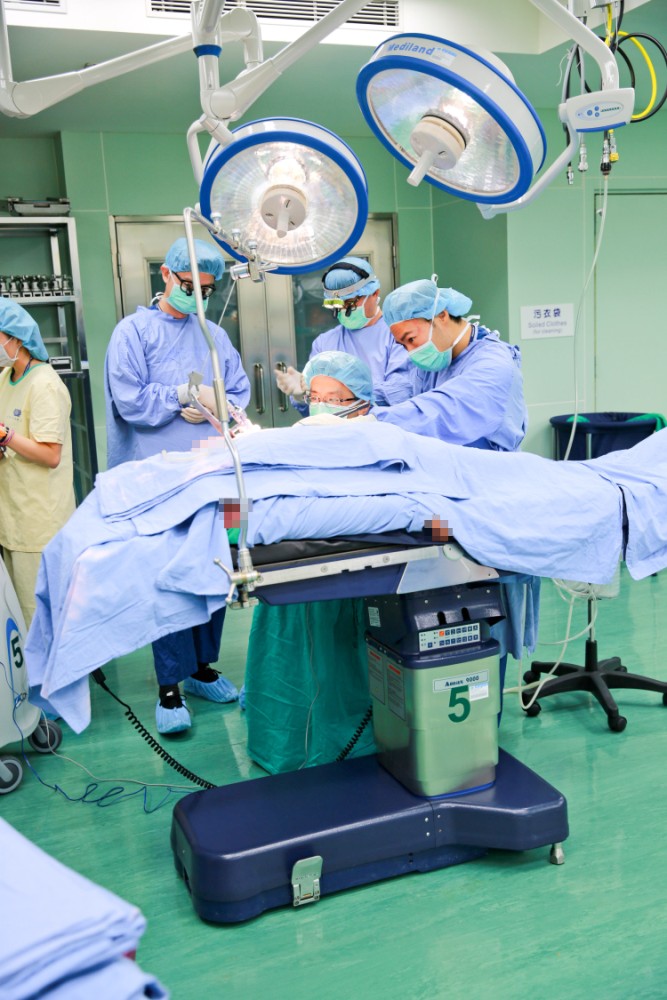
For better surgical angles, surgeons kneeled on the floor to perform surgical procedures. Photography / Huang SiChi

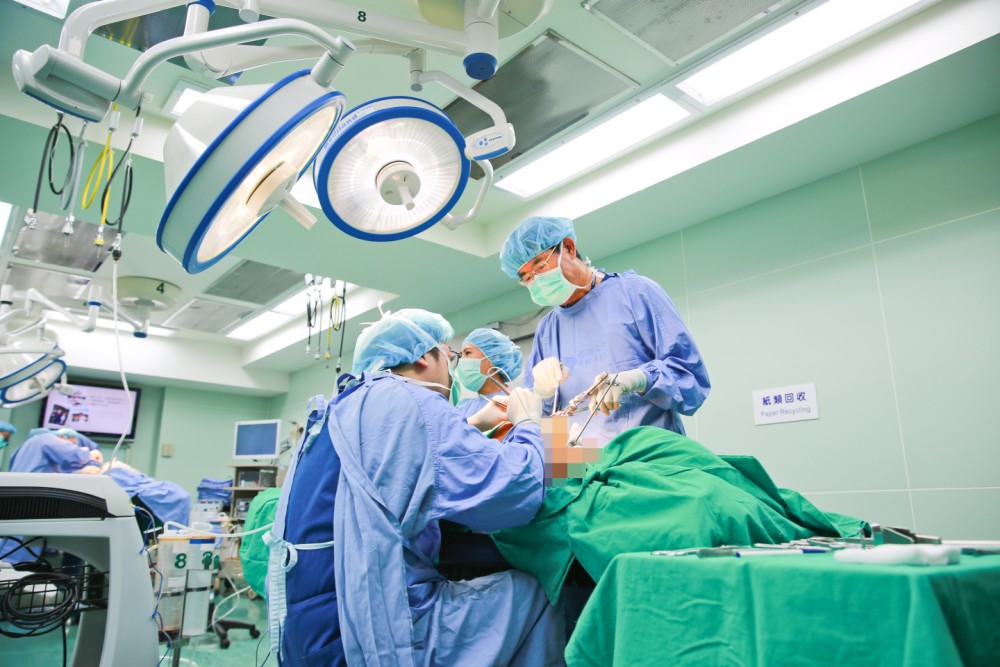
Experienced surgeons, through advanced simulation surgery classes, explore new surgical procedures for the benefit of future patients. The picture shows the Open-Heart simulation surgery. Photography / Huang SiChi
Microscopic Heart Surgery - make mistakes only on the teachers
On November 6th, 13 hospitals, more than 20 cardiothoracic surgery specialists participated in a silent mentor simulation surgery. "I would like to thank the silent mentors for the opportunity to practice, they gave us more confidence in the health of the patients," said Chen Yi-xiang, Chairman of the Taiwan Heart Chest Surgery Association. This is the first time that I have participated with the Tzu Chi University and Hualien Tzu Chi Hospital. This opportunity, with the environment and equipment, allowed physicians to have the chance to practice every technique!
One of the focuses of this simulation was the "minimally invasive" approach, most commonly found in heart valve repair and replacement surgery, and minimally invasive coronary artery bypass surgery. Hualian Tzu Chi Institute of Surgery, Deputy Director Zhang Rui Zhi said that the current trend of surgery is to make the wound smaller, which means less bleeding and shorter recovery time.
"I am grateful to the teachers and their families for their selflessness," Zhang Ruizhi stated. No patients want doctors to practice on their bodies. With the dedication of silent mentors, doctors have real opportunities to practice innovative technology and be familiar with each procedure and steps. Therefore, to the Hualien Tzu Chi Hospital doctors, this is a very happy story. Physicians have more psychological and technical preparation and practices, they become more confident in operating on patients with minimally invasive surgery.
"Doctors will get old and sick, so I hope that through this efficient and humanistic way of teaching, new doctors will acquire the experience."
Chen Yixiang pointed out from statistics gathered between 2000-2014, with the progression of medical technology and cardiac interventional treatment of cardiac catheterization; the traditional open hearts surgery is significantly reduced. He stressed that about 10% of the current surgery is through minimally invasive way, with the medical technology and technological progress, the proportion of future minimally invasive surgery will increase. The "open heart surgery" using minimally invasive techniques is creating more pressure on medical professionals. With the traditional thoracotomy, wounds are larger so they allow a wider view for doctors to see the problem and to deal with then directly. However, with smaller wound in a microscopic surgery, the view and operating space is limited. Therefore, the room for errors becomes smaller! With silent mentors and the advanced operating room equipment, doctors are able to fine tune possible mistakes, and thus avoid future mistakes on patients.
Orthopedics trying the best techniques
The orthopedic surgeons also participated in the advanced anatomy operation course at the Tzu Chi University in 2015 and 2016. Twenty nine courses were conducted from November 2nd to 7th in 2015; participants were from 157 faculty members in 51 hospitals in Taiwan.
This course was jointly organized by the Taiwan Orthopedic Medical Association under the Joint Reconstruction Medical Association, Hand Surgery Society, Taiwan Spine Surgery Society, Taiwan Orthopedic Trauma Medical Association and other four societies for the first time. Hualian Tzu Chi Hospital honorary superintendent and Executive Director of Taiwan Orthopedic Medical Association Chen Yinghe (now Chairman of the Institute) expressed that field of medicine is vast and endless. With science and technological innovation, doctors cannot just learn at seminars or literatures, but also must practice on the human body. Because it is impossible to practice on patients, the simulation operation at the Tzu Chi Hospital allows physicians to use step-by-step approach and explore new methods from inside-out, front to back in a variety of ways. Physicians can try out a minimally invasive approach to achieve the best purpose of surgery.
Chairman of the Reconstruction Medicine Association, Xu Hongchang, said that the human body is very complex, a surgeon must continuously explore methods with minimal destruction to the body, and simulation provides an opportunity for dissection. Zhang Zhihao, Director of the Hand Surgery Medicine felt that home visits to the silent mentors made one feel the trust from the families as opposed to the physician's responsibility. He said home visits, simulation study, and the final gratitude ceremony is a significant process and unforgettable experience.
"With the progression of science and technology, the improvement on spinal surgery implants and the technology, every physician needs to keep learning. The participants would personally perform each task from seven in the morning to six in the evening. Because of the silent mentor program, physicians reflect on the meaning to help others," said Professor Huang Congren, Director of the Spine Surgery Association. Chairman of the Orthopedic Trauma Care, Li Peiyuan, expressed that the simulation surgery courses will take Taiwan orthopedic elite doctors back to the birthplace of medical education mentors – the cadavers. In addition to learn the required professional courses, physicians were able to recall and reminiscent their past in applying to the Department of Medicine at 18 for medical school; how they took the oath of being a doctor at graduation, and how they contemplated their expectation when getting their specialist license.
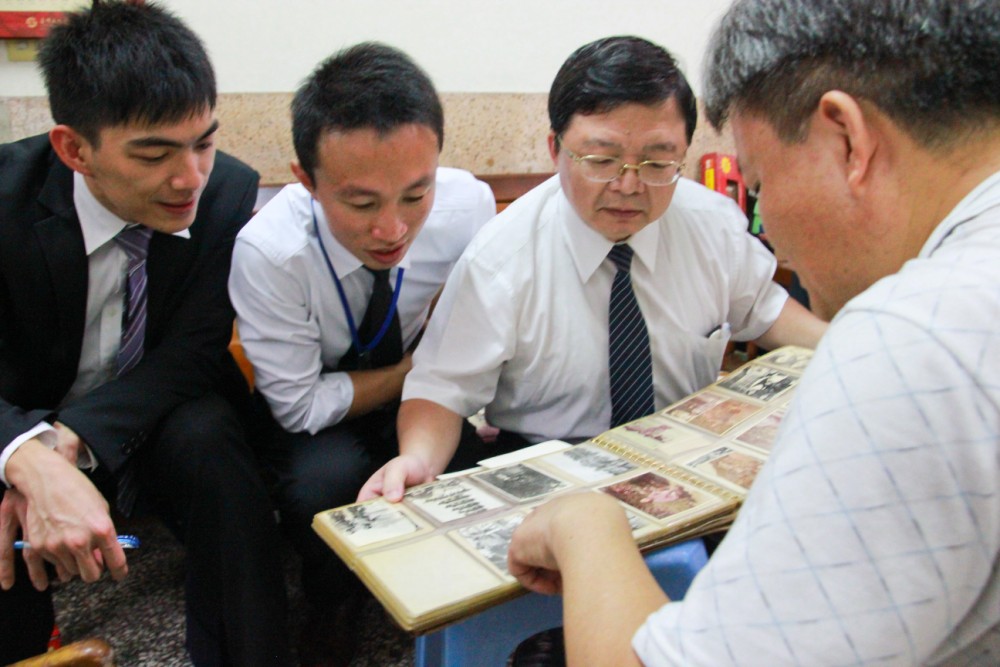
Before the start of the simulation surgery, teaching physicians and student physicians visited the cadaver family members to understand the teacher's life and the expectation from the physicians, and to express gratitude. Top - the Hualien Tzu Chi Hospital Orthopedic Chen Ying Ho, Honorary Superintendent. Bottom - the Dalin Tzu Chi Hospital ENT doctor, Ho Shun-Chuan. Top picture photography / Chuon Min Chen, bottom picture photography / Zhang Shilin
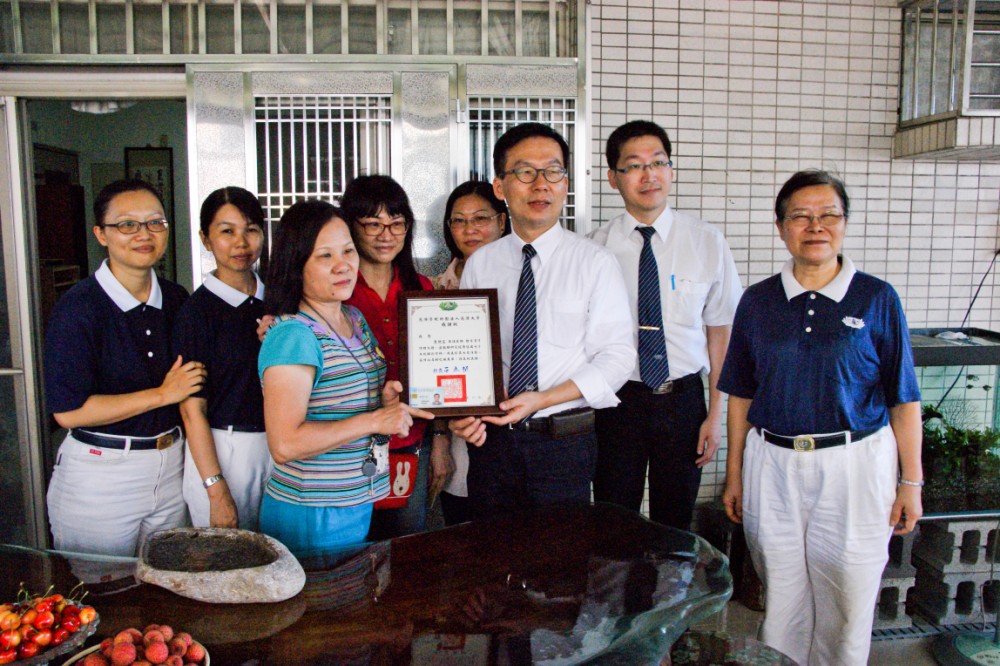
Silent mentors benefit over 120,000 orthopedic patients
In the orthopedic surgeon course from October 3 to 7, 2016, the number of students increased. Two hundred and sixteen physicians from fifty-five hospitals in Taiwan were trained for rare surgeries in Taiwan. Elite physicians take part in arm transplant surgeries, minimally invasive arthroscopic surgeries, armpit nerve plexus surgeries and other twenty-eight kinds of surgeries.
After 4 days of the simulated operations on October 7th, bracing for a storm and typhoon season, Tzu Chi University Principal Wang Benrong, honorary dean of the Hualian Tzu Chi Hospital President Chen Yinghe, Director of Orthopedics Wu Wentian, Hand Surgery Clinic Lin Youde, Director of Orthopedic Ankle Medical Society Wang Zhenqi, Director of the Spine Surgery Society Wang Shidian, Zhou Boxin Secretary-General, Chairman of the Orthopedic Trauma Medical Society Li Peiyuan, and all Orthopedic practitioners participated in a gratitude ceremony to the silent mentors and their families with their deepest gratitude.
Hualian Tzu Chi Hospital Orthopedic Director, Wu Wentian, described the four day classes with a daily average of sixty students, even at one point 90 students jammed in the simulation operating room, the operating room was always quiet and solemn throughout, everyone was very focused.
Department of Orthopedic Foot and Ankle Professor Wang Zhenqi gave thanks; this was the very first time in Taiwan where doctors can learn minimally invasive arthroscopic surgery on cadavers. Five or six years ago, Taiwan had a similar course, but with frozen long limbs, there was no way to get like the sensation of live surgery. Chairman of Orthopedic Trauma Medical Association, Li Peiyuan, shared that the course had enrolled more than two hundred doctors. Each physician, on average, performs over six hundred operations per year; equivalent to 120,000 patients benefiting indirectly from the silent mentors. Hui expressed sincere gratitude to these silent mentors for the improvement of Taiwan's medical care.

At the beginning of November 2015, Orthopedic surgeons from fifty-one hospitals in Taiwan came to the University of Tzu Chi to participate in simulated surgery, the students were prepared prior the actual surgery. Photography / zhangyi chuan
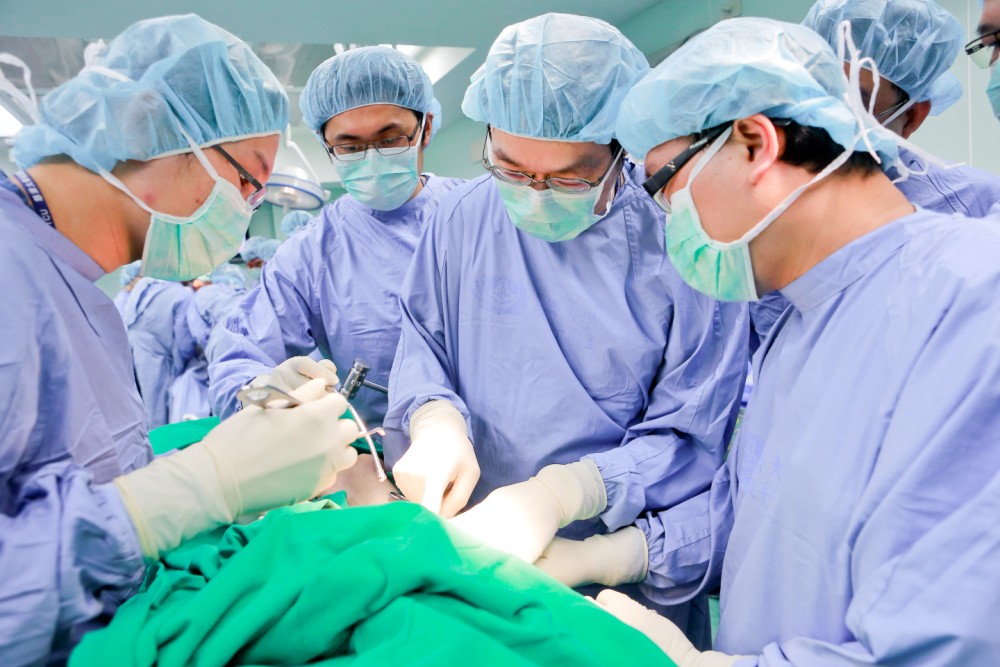
Orthopedics, Professor Chen Ying Ho (right) are happy to pass on surgical experience to new physicians. Photography / Xu Ronghui
Dedicated to medical care through great giving
In 2002, Tzu Chi University opened a simulation course for the very first time, and in conjunction with Hualien Tzu Chi Hospital surgical team to teach medical students regarding bedside clinical skills and surgical technique training. It wrote a historic page on Taiwan medical education. In 2008, the Medical Simulation Center of Tzu Chi University was set up four times a year to provide training courses for medical students and residents in March, June, September, and December. Other time will then be open to the various medical science applications.
Principal Wang Benrong shared, “there are more than 40,000 people who signed a general donation agreement to the Tzu Chi University. This enabled doctors to go from understanding of the bodies to enhance their clinical skills through simulation surgeries.”
Every silent mentor has their own story, such as: 23-year-old Zhang Guosheng, who suffered from lymphoma when he was 18 years old. He was unable to attend college and thus decided to devote himself as a teacher for the physicians. Wang Junxiong had only elementary education; he was from the Hualien moon tribe of the Amis. He felt that becoming a teacher to the physicians is amazing. In addition, the oldest silent mentor is 96-year-old Li Zuo-lin, who came to Taiwan from ZheJiang after the China civil war, was married in Taiwan, and final dedication of his body to the medical education ... all the silent mentors, unlimited gratefulness, unlimited blessing ...
